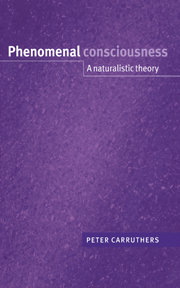Book contents
- Frontmatter
- Contents
- List of figures
- Preface
- 1 Assumptions, distinctions, and a map
- 2 Perspectival, subjective, and worldly facts
- 3 Explanatory gaps and qualia
- 4 Naturalisation and narrow content
- 5 First-order representationalism
- 6 Against first-order representationalism
- 7 Higher-order representationalism: a first defence
- 8 Dispositionalist higher-order thought theory (1): function
- 9 Dispositionalist higher-order thought theory (2): feel
- 10 Phenomenal consciousness and language
- 11 Fragmentary consciousness and the Cartesian theatre
- Conclusion
- References
- Author index
- Subject index
Conclusion
Published online by Cambridge University Press: 30 September 2009
- Frontmatter
- Contents
- List of figures
- Preface
- 1 Assumptions, distinctions, and a map
- 2 Perspectival, subjective, and worldly facts
- 3 Explanatory gaps and qualia
- 4 Naturalisation and narrow content
- 5 First-order representationalism
- 6 Against first-order representationalism
- 7 Higher-order representationalism: a first defence
- 8 Dispositionalist higher-order thought theory (1): function
- 9 Dispositionalist higher-order thought theory (2): feel
- 10 Phenomenal consciousness and language
- 11 Fragmentary consciousness and the Cartesian theatre
- Conclusion
- References
- Author index
- Subject index
Summary
The ‘hard problem’ of phenomenal consciousness turns out to be not so very hard, after all. Here let me mention some of the main factors necessary for its solution, before reviewing the benefits of dispositionalist higher-order thought (HOT) theory.
In order to resist the various ‘mysterian’ arguments for the view that phenomenal consciousness is incapable of reductive explanation, we need to make a clear distinction between concept and property, and to realise that our task is that of explaining the nature of the properties involved in phenomenal consciousness. We also need to recognise that the relevant properties are worldly, thickly individuated, entities, of the kind needed to account for change and causation in the natural world. It follows that an explanation of phenomenal consciousness should not be a priori, and will not have the status of a conceptual truth; and that it cannot, therefore, be tested and refuted by mere conceivability experiments.
The task of a naturalistic explanation is not to provide an analysis of our concept of phenomenal consciousness; nor is it to locate the essence of phenomenal consciousness, if that means identifying what is common to all possible worlds where our concept of phenomenal consciousness would find application. For our concern is with the nature of the property which our concept of phenomenal consciousness actually picks out, considered as a concept-independent, thickly-individuated, entity. So we should accept that in seeking a reductive explanation of phenomenal consciousness we are not bound to account for its existence in all possible worlds in which it occurs.
Information
- Type
- Chapter
- Information
- Phenomenal ConsciousnessA Naturalistic Theory, pp. 325 - 329Publisher: Cambridge University PressPrint publication year: 2000
